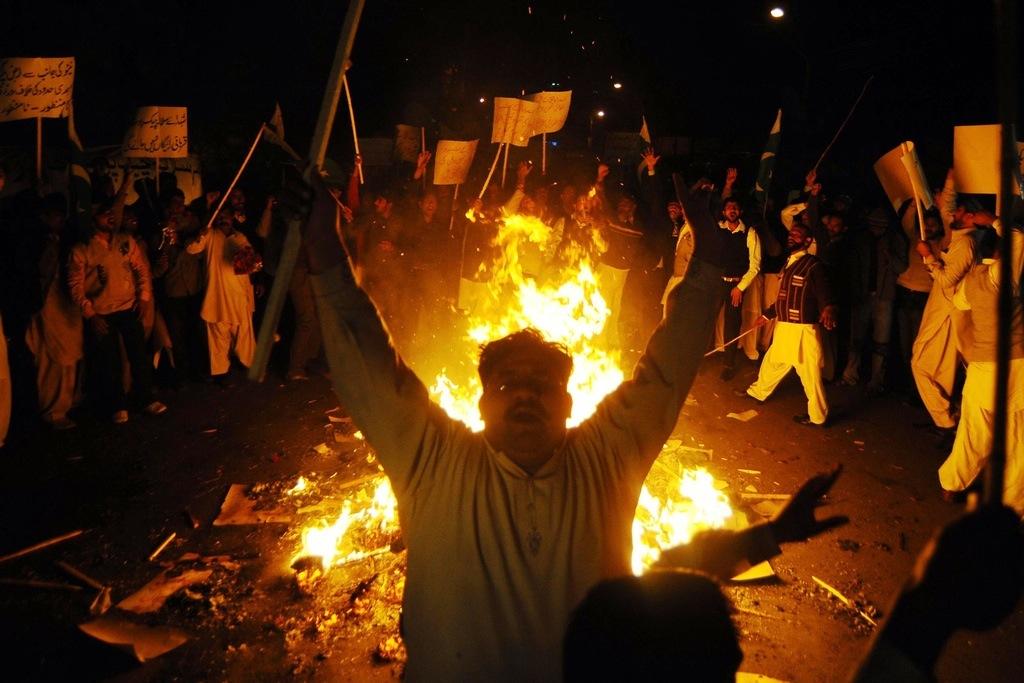Closure of NATO supply routes leaves thousands of Pakistanis jobless
Pakistanis burn NATO in effigy in a protest against NATO strikes.
ISLAMABAD, Pakistan — A record one and half month-long closure of two key NATO supply routes via Pakistan is squeezing the allied troops in war-stricken Afghanistan.
It has also rendered thousands of Pakistanis jobless.
Hundreds of containers loaded with non-lethal supplies, including oil and food — which remained lined up along the northeastern Torkhum border, and southwestern Chaman entrance since the last week of November 2011 — have started returning to their home destinations as backdoor diplomacy aimed at coaxing an irate Pakistani government to reopen the supply routes seems to have yielded few results.
Naseem Khan is one of thousands of people who have been making a living for last ten years transporting supplies for NATO troops from the southern port city of Karachi to southern and northeastern Afghanistan. In an interview, Khan said that he was frustrated by the failure of diplomatic efforts.
"I have been relying on my savings for the last month and a half," said Khan, who has been working as a crew member for a local transporter for the last seven years.
Read more: Zardari forms confidence motion for Monday vote
Pakistan closed down the two supply routes on Nov. 26, after NATO air strikes killed 26 Pakistani soldiers in a firefight near the border of northeastern Afghanistan.
A Pentagon-led investigation found that the incident was a result of miscommunication and poor coordination. But Pakistan rejected the inquiry, and believes the strike was a deliberate attack.
NATO transports 70 to 80 percent of its non-lethal supplies through these two routes.
The forces also have alternative routes through Central Asian states. But those routes are much more costly, particularly as the US economy struggles.
Working as a NATO supplier has always been risky. Hundreds of containers have been attacked by Taliban fighters in Pakistan and Afghanistan. Drivers and crew are sometimes injured or even killed.
Read more: The American drone wars
But the work also offers generous salaries, insurance and other benefits that have lured thousands of Pakistanis to join the business as drivers, crew members, porters, and port and shipping related workers, during the past decade.
Crewmembers hauling NATO containers, all of which are owned by Pakistanis, earn six to eight times more than their colleagues who work for ordinary transporters. A crewmember used to earn about 500 dollars per month, while a non-NATO crew member might earn only 75-95 dollars each month.
In case of casualty or loss of container in Taliban attacks, the family members of the deceased and the owners are compensated heavily.
Khan, a Karachi native, said he only has a few more months of savings left to provide for his household. And he considers himself lucky to have that much.
"This is because of the good salary I used to draw (by working for NATO) that I am able to survive despite being jobless," he said.
Read more: Closed-border party
However, high inflation and ever-rising unemployment have left few chances for him and the thousands of other out-of-work drivers and crewmembers to find a new job.
"The traditional goods transportation system (within the country) is already shrinking due to poor economic conditions. Therefore, it is hard for us to employ people in such a huge number," Malik Sarwar Khan, a leader of Pakistan’s goods transportation association, told Global Post.
"We are already laying off our existing staff. I am afraid I have no good news for those who have gone jobless due to the closure of NATO supply routes," Sarwar Khan said.
According to government figures, Pakistan has conceded a loss of 68 billion dollars in the war on terror during the last decade, due to local and foreign capital flight, and investment losses. It has received around 12 billion dollars under aid, and coalition support fund accounts.
The World Bank, and the IMF figures say that nearly 34 percent of Pakistan’s population lives below the poverty line. Government figures say the number is lower, between 18-20 percent.
Like many analysts, Khan and Sarwar Khan hope the two sometimes-allies will come to some agreement.
"We too are sad over the killing of our soldiers. This was very unfortunate and should not have occurred," Khan said.
But he wants his job back.
